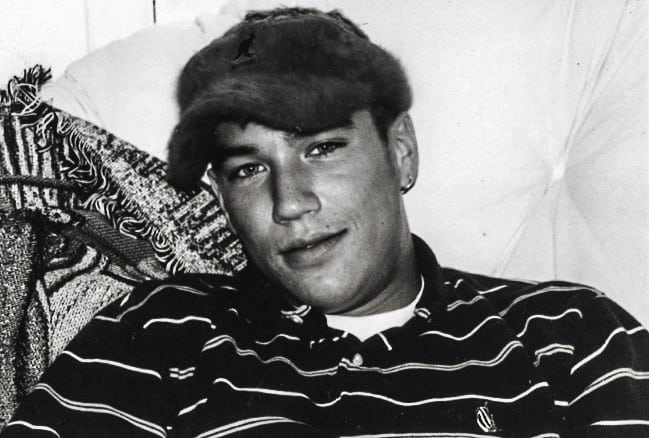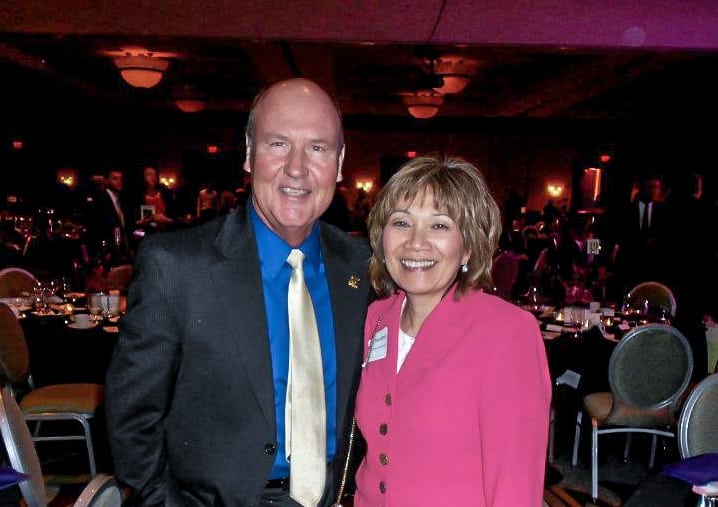After losing his son David to inhalant abuse, Kim’s grief as a parent and personal struggle with addiction pushed him to get treatment, promote recovery and advocate for people with addiction disorders.
Meet Kim
Around 2 o’clock on June 9, 2001, Kim and Marissa Manlove received the phone call that would change their lives forever. They found out their 16-year-old son David had died after huffing inhalants.
In Kim’s anguish, he slipped into addiction. Eventually, he sought professional treatment and found recovery amid his grief. Today, Kim dedicates his days to helping others who need treatment.
A Kid with a Great Grin
People couldn’t help but love young David Manlove. A standout athlete, sharp student and thoughtful son, he was adored by his parents and older brother. His handsome, friendly grin and fun-loving nature won the hearts of many friends and classmates.
But as he grew into a young teen, things began to change. Slowly, David drifted from his circle of trusted childhood friends. He found himself in a different crowd with different interests: cutting class, drinking and abusing drugs.
Treatment Can Be Life Changing. Reach out today.
Whether you are struggling with addiction, mental health or both, our expert team is here to guide you every step of the way. Don’t wait— reach out today to take the first step toward taking control of your life.

This change was not lost on his parents. Kim recalls seeing signs of his son’s drug use in middle school, as early as age 13.
“We’d heard from some friends and parents that David had been seen drinking and smoking marijuana and things like that,” he says. “We had some indications.”
One night, David came home from a party very inebriated. Kim recalls, “When we confronted him, he admitted that he had been using substances but said, ‘No, I don’t think I have a problem.’”
Regardless of David’s insistence that this was a non-issue, the Manloves decided to have their son professionally assessed at a local teen drug rehab facility. After an honest conversation with David, the facility’s staff found a serious level of dependency in the teen. They recommended he enter their outpatient program, a less intense treatment option than residential inpatient care.
The Manloves first went ahead with an already-scheduled family vacation. They returned home to find that their local facility’s program was full. At that point, David insisted that he would stop using and his parents believed they could keep an eye on him themselves, administering home drug screens and checking in often.
A few months passed and all seemed fine, but David’s older brother Josh insisted that his sibling was still using substances. One December night, David came home with giant pupils and admitted that he had been drinking and dropping acid. They all decided it was time for treatment.
At first, David was not happy to be in rehab. However, after talking to counselors and his peers at the facility, the young man gradually acknowledged his problem and began to engage himself in the treatment program.
After about six months of outpatient rehab, David began to show real signs of progress. He convinced his family that he wouldn’t let anything get in the way of his recovery. So, Kim and Marissa began to restore their son’s privileges, allowing him to spend unsupervised free time with his friends again.
David Didn’t Come Back
One evening, David and a buddy went over to a neighbor’s house to enjoy the swimming pool. The boys had learned that certain inhalants (in this case, canned computer duster) could be used to get high, and wouldn’t show up on David’s required drug screens. They had also found that huffing inhalants with a straw while underwater would intensify the rush.
The kids took turns passing the duster back and forth — one huff after another. And then, David didn’t come back to the surface.When his friends saw he wasn’t moving, they frantically pulled him out of the water and called 911. An ambulance arrived within minutes.
“EMTs were there right away, but he was gone pretty quickly.”
Marissa rushed to the house, only to find her son lying unconscious on a gurney, his feet blue. It was too late. He was gone.
Kim & Marissa Had Lost Their Son
David had suffered Sudden Sniffing Death Syndrome, a form of heart failure caused when strenuous activity occurs directly after inhalant abuse. This horrifying accident can befall anyone who huffs, even if it is their first time.
The word devastation does not begin to touch the Manlove family’s level of grief. They began to speak out about their experience to help other families avoid the same painful reality.
Kim blamed himself for his son’s death.
Despite his dedication to outreach, Kim’s despair gripped him like no pain he had ever felt. He inwardly believed himself to be at fault for David’s drug problem and death because of the link between genetics and addiction — the disease ran in his family.
“When I wasn’t able to help my son, I really internalized all that. Even though we were getting involved in others’ recovery efforts and making a difference with David’s story, the natural depression that takes place after the death of a child continued to escalate for me.”
Doctors prescribed the relaxant Xanax for Kim to help him cope, but as the guilt festered inside of him, he began taking more and more of the drug. He started drinking huge amounts of hard liquor each day, further exacerbating the struggle. After two years, Kim found himself helpless against the power of the substances surging through his body.
Two years after David’s death, Kim’s wife and older son arrived home to find him in a drunken stupor, saying he wanted to kill himself. They immediately insisted that he go to the nearby treatment center where David had gone. Fortunately, Kim agreed, and soon found himself sitting in the same chairs where his son had sat just a couple of years earlier.
Healing and Hope
Kim fully committed himself to recovery, deeming David the “higher power” that would keep him strong in that commitment.
Treatment saved Kim’s life, and it changed his family forever. He’s been in long-term recovery for over 15 years now, and still goes to 5 or 6 meetings a week. After 25 years in academia, Kim became the director of the nonprofit Indiana Addictions Issues Coalition, where he promotes recovery and advocates for people with addictive disorders.
Kim says, “It’s not easy to talk about this, but it’s helpful. Marissa and I are all about remembering where we’ve come from, and doing everything we can to help other people.”
Q&A with Kim: A Father’s Advice to Others
Q: How did you and your wife find out about David’s substance abuse?
We’d heard from the mother of a friend that he had been seen using inhalants. My son said to his mom, “I know this could kill me. But I would never do anything that stupid.” Those were his exact words. And that’s the power of the disease, of addiction. Even though those of us whosuffer from addictionwant to do the right thing, the desire to get high can overpower. He was only 16. He just wanted to have fun with his friends, but it took his life.

Q: What would you tell a parent who wonders whether their teen is abusing substances, but opts to shrug it off?
If you think your kids are using drugs, you need to do something about it right now. It’s not this whole business about it being “part of the adolescent experience.” That’s more a falsehood today than it was years ago, because of the availability ofheroinand meth. Today’s drugs are stronger and more available than they’ve ever been before. Parents want to think the best; they want to think, “No, this isn’t happening.” I think the most confusing problem with addiction is denial.
Q: When should a parent seek treatment for their child?
At the first sign of abuse, you need to seek professional help. I think parents are ashamed; there’s astigma against drug addiction. But we need to look at addiction for what it is: a chronic medical disease. When our kids have the flu or infection, we bring them to the doctor. We need to take that same approach with the firstsigns of substance use.
When you see regular abuse of any sort — which means drunkenness or altered states — that’s when you talk to a professional. We delayed too long for that. We should have gone in months before we did, but we kept thinking, “He’ll get over this. It’s a natural thing; he’s experimenting.” That was our denial. We didn’t understand how serious this was. You want to see a doctor about this now.
Kim Manlove is the director of the Indiana Addictions Issues Coalition. He is also a founding board member of The 24 Group, a foundation for recovery support — named after his late son’s high school baseball jersey number.








